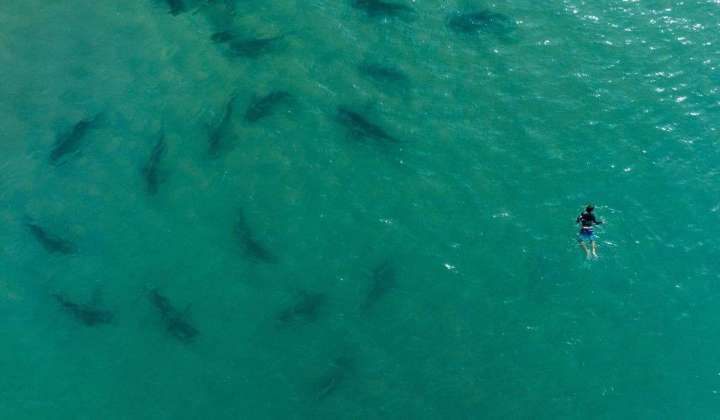Shark! How swimmers can improve their odds of avoiding bites

Don’t swim at dawn or dusk. Stay in groups. And take off the bling, because predators in the water might mistake you for a sparkly fish.
These are some of the ways swimmers can reduce their risk of a shark bite, a rare yet terrifying event that can be deadly — or at least ruin your summer.
Experts say sharks are likelier to attack an individual than multiple swimmers together, and sharks like to hunt at the start or end of the day, so avoiding those hours is best.
It’s also smart to avoid river and estuary mouths, and staying close to shore will increase your chance of getting help after a bite, said Yannis Papastamatiou, an associated professor and marine biologist at Florida International University.
Reported shark attacks on humans have increased across the world since the early and mid-20th century, though that may reflect better record keeping.
“The main reason for the increase globally is simply because there are more human water users — more humans in the water, then the greater the chance of someone getting bitten,” Mr. Papastamatiou said.
He said incidents can spike in certain areas because a shifting climate redistributes sharks, or shark populations rebound in certain waters.
For instance, water quality along Long Island has improved in recent years, letting bluefish and bunker fish flourish and increasing the odds that predators like sharks will seek them out.
A 65-year-old woman was bitten on the leg Monday at Rockaway Beach in Queens, prompting emergency care and temporary beach closures in the area to allow for drone and harbor-unit surveillance. The victim is in stable condition after the first shark bite in New York City in recent memory.
The Red Sea region has seen several fatal attacks in the past two decades. In June, a Russian man was killed in a shark attack caught on video while swimming off a beach near an Egyptian resort.
Sharks sometimes bite humans by mistake. Other times they’re protecting their space much as a dog will bark at or bite an intruder, according to the Florida Museum of Natural History.
“They have a reputation as bloodthirsty killing machines, but this view is distorted,” the museum says on its webpage. “Sharks are not unique in consuming animals. For example, humans are predators, eating cattle, pigs, chickens, fish and other creatures.”
The U.S. typically tops all other nations in annual shark incidents. Australia is another hot spot.
The world saw 57 confirmed unprovoked shark bites in 2022, down from a recent yearly average of 70, according to the museum’s International Shark Attack File, which says you’re likelier to die from lightning, a bee sting or a bite from a dog or snake.
Still, it’s good to be cautious in the water. The shark-attack file has a webpage with over a dozen tips on how to avoid a shark bite.
The tips range from the obvious — “Do not harass a shark if you see one!” — to overlooked ways you can increase your odds of safety, such as avoiding shiny jewelry because it could resemble the sheen of fish scales when the light hits it.
Sharks recognize contrasts well, so bright clothing might draw their interest, and the areas between sandbars or steep drop-offs in the water are common hangouts for sharks.
“Do not enter the water if bleeding from an open wound, and enter with caution if menstruating — a shark’s olfactory ability is acute,” the tip sheet says.
People should be proactive if attacked by a shark, with repeated hits to its snout to curtail it.
“Try to get out of the water at this time. If this is not possible, repeated blows to the snout may offer a temporary reprieve, but the result is likely to become increasingly less effective,” the shark file advises. “If a shark actually bites, we suggest clawing at its eyes and gill openings, two sensitive areas. You should not act passively if under attack, as sharks respect size and power.”
Mr. Papastamatiou said most shark bites in the U.S. occur in Florida, generally followed by California and South Carolina.
“A lot of bites are just bad luck, and the chance of getting bitten is very small,” he said. “Most importantly, if you are going into the ocean, be vigilant.”






